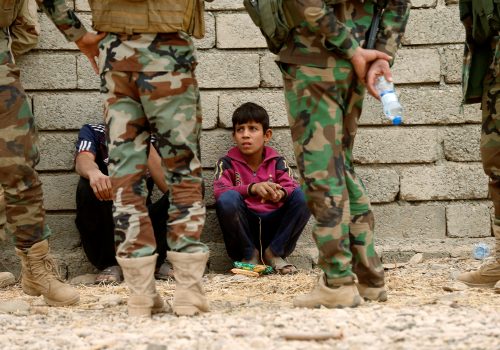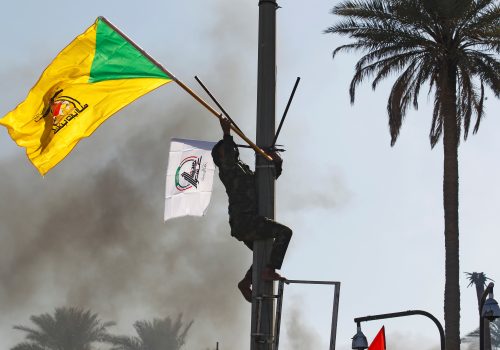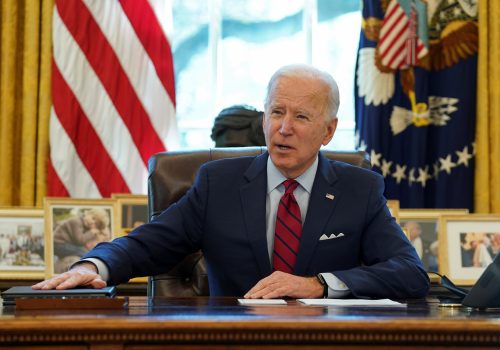FAST THINKING: The war against ISIS isn’t over
JUST IN
“We will come after you and find you.” That was US President Joe Biden’s message to global terrorists after the death of Islamic State leader Abu Ibrahim al-Hashimi al-Qurayshi in a special-forces raid in northwest Syria. Qurayshi detonated a bomb, killing himself and his family, according to Biden. What are the implications for the fight against ISIS and Biden’s anti-terror strategy? Our experts lay out the stakes.
TODAY’S EXPERT REACTION COURTESY OF
- Nathan Sales (@AmbNathanSales): Nonresident senior fellow at the Scowcroft Middle East Security Initiative, former US ambassador-at-large and coordinator for counterterrorism, and former special envoy to the Global Coalition to Defeat ISIS
- William Wechsler (@WillWechsler): Senior director of Middle East programs and former deputy assistant secretary of defense for special operations and combatting terrorism
- Jomana Qaddour (@JomanaQaddour): Resident senior fellow and co-founder of the humanitarian organization Syria Relief & Development
- Thomas S. Warrick (@TomWarrickAC): Senior advisor at the Scowcroft Middle East Security Initiative and former counterterrorism official at the Department of Homeland Security
Biden’s bold move
- Qurayshi’s death takes a major terrorist leader off the battlefield, one who has led the group since the 2019 death of Abu Bakr al-Baghdadi in a similar raid. “At a time when ISIS is unleashing new waves of violence in the Middle East, Afghanistan, and Africa, the loss of its leader is a crippling blow,” Nathan tells us.
- That’s not the only reason this raid is “unquestionably good news,” Will points out. This operation shows that Biden—who as vice president advised against the 2011 raid on Osama bin Laden—“is now more willing to take such actions… with all of the accompanying risks.”
- And this was a risky move. Biden could have chosen an airstrike to take out Qurayshi, but instead he authorized a raid—which Will says means that he intended to take the terrorist leader alive. But while it is designed to limit civilian casualties, such an operation risks American lives, and if it failed, the president would have seen serious damage to his political fortunes, Will adds.
- And future operations will be even more risky than Thursday’s raid, Will points out. But Biden’s move “increases the likelihood that future decisions will be made dispassionately and with resolve,” he says.
Not dead yet
- Combating ISIS will require serious resolve, especially since Jomana says the terrorist group’s “financial and logistical operations continue to grow stronger in the central Syrian desert,” where she says it has turned to smuggling to raise cash after losing control of oil fields.
- And the group still has popular appeal because of the ongoing disaster in Syria. “Hunger and poverty are rising sharply, and the group’s ideological teachings remain accessible among the population,” Jomana says.
- Tom isn’t optimistic either, pointing to the recent ISIS takeover of a Syrian prison in an attempt to free hundreds of its fighters: “The terrorist threat of ISIS is not dead, even if its most recent leader is.” To stay ahead of that threat, the United States and its allies must keep the group “under continuous pressure,” Tom adds.
Watch the ‘horizon’
- How will that pressure come? Will says the success of Thursday’s raid likely makes Biden more willing to approve the more risky operations yet to come if he is to execute “over-the-horizon” counter-terrorism capabilities to disrupt external threats from Afghanistan—which Will says is “all that is really left of Biden’s Afghanistan policy.”
- But Tom points out that this anti-ISIS operation doesn’t resemble an “over-the-horizon” approach. In the case of Syria, there are nearby US and NATO installations in Turkey and the Gulf. So the raid, Tom adds, “shows the importance of the United States maintaining a presence in these areas and keeping up relations with host-country military forces, including the Syrian Kurdish forces in northeast Syria.”
- Those forces would have a hard time containing ISIS without the United States, so “it remains unwise to push for a US exit from northeast Syria,” Jomana tells us. That’s because ISIS “is eager to rebuild,” she adds, and they “remain a significant threat” to US and allied forces, as well as civilians.
Further reading
Thu, Aug 19, 2021
ISIS is defeated. What becomes of the ‘Cubs of the Caliphate’ in Iraq?
MENASource By
In the aftermath of sanctions, three wars, and continued violence, Iraq’s infrastructure and established child services networks remain debilitated. The reintegration of child soldiers is an extensive and long-term project that demands more than Iraqi institutions can give.
Fri, Feb 26, 2021
Experts React: US airstrike in Syria targets Iran-backed militias
MENASource By
On February 25, the US military carried out airstrikes in eastern Syria that targeted Iran-backed Shia militias. The move is the first military action under the Joe Biden Administration. The retaliatory strike comes after a rocket attack on February 15 near the Erbil Airport that killed a US military contractor and injured several, including a US service member. With nuclear negotiations on the horizon, what will this mean for the Biden administration’s ongoing effort to re-engage Iran?
Mon, Feb 1, 2021
How President Biden can tackle the Middle East’s biggest problems
MENASource By
In a first project of trilateral collaboration, the directors and strategists from leading think tanks in the US, the UAE, and Israel have submitted nine recommendations on issues that deserve priority treatment from the new administration.
Image: US President Joe Biden speaks about a US Special Forces operation in Northern Syria against ISIS leader Abu Ibrahim al-Hashemi al-Quraishi, from the Roosevelt Room of the White House in Washington, DC, on February 3, 2022. Photo via REUTERS/Sarah Silbiger.


